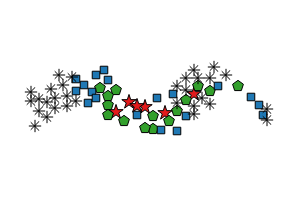Terrain Processor: Area: Low-density Cluster (strip): Difference between revisions
Jump to navigation
Jump to search
(Created page with "Area__NOTOC__ {| cellspacing="0" style="background:#eee" | '''Task name''': Area: Low-density Cluster (strip) '''Dll plugin name''': BIT...") |
No edit summary |
||
| Line 1: | Line 1: | ||
[[Category:Terrain Processor Manual|Area]] | [[Category:Terrain Processor Manual|Area]] | ||
{| | {{TerrainProcessorManual|Area: Low-density Cluster (strip)|BITasksPlugin.dll|Polygon, PolygonM, PolygonZ|No|= | ||
|DESCRIPTION=Algorithm used for populating low-density areas. Objects are organized in linear clusters. | |||
|TASKPARAMETERS=* '''RANDOM SEED''' - number used to initialize pseudorandom number generator. | |||
| | |||
Algorithm used for populating low-density areas. Objects are organized in linear clusters. | |||
= | |||
* '''RANDOM SEED''' - number used to initialize pseudorandom number generator. | |||
* '''HECTARES''' - area size in hectares (individual for each shape). | * '''HECTARES''' - area size in hectares (individual for each shape). | ||
* '''CDENSHA''' - The density of the filling in number of clusters for hectare. | * '''CDENSHA''' - The density of the filling in number of clusters for hectare. | ||
= | |OBJECTPROTOTYPEPARAMETERS=* '''OBJECT''' - Object's prototype name | ||
* '''OBJECT''' - Object's prototype name | |||
* '''MINHEIGHT''' - Minimal size in % | * '''MINHEIGHT''' - Minimal size in % | ||
* '''MAXHEIGHT''' - Maximal size in % | * '''MAXHEIGHT''' - Maximal size in % | ||
| Line 24: | Line 12: | ||
* '''MINCOUNT''' - Minimal count of objects in one cluster | * '''MINCOUNT''' - Minimal count of objects in one cluster | ||
* '''MAXCOUNT''' - Maximal count of objects in one cluster | * '''MAXCOUNT''' - Maximal count of objects in one cluster | ||
= | |USAGE=Similar to the "Area: Low-density Cluster (circle)", creates prolonged clusters of given width. Perfect for small tree groups, or for adding lines of undergrowth into forests. | ||
Similar to the "Area: Low-density Cluster (circle)", creates prolonged clusters of given width. Perfect for small tree groups, or for adding lines of undergrowth into forests. | |ALGORITHM=For each shape (areal) do : | ||
= | |||
For each shape (areal) do : | |||
# clusters_count = HECTARES * CDENSHA | # clusters_count = HECTARES * CDENSHA | ||
# For clusters_count : | # For clusters_count : | ||
| Line 38: | Line 24: | ||
#### If position = cluster_center + direction_vector id inside shape and condition MINDIST[n] is ok, then 3. else 1. | #### If position = cluster_center + direction_vector id inside shape and condition MINDIST[n] is ok, then 3. else 1. | ||
#### Create new instance for object prototype in position. | #### Create new instance for object prototype in position. | ||
= | |SAMPLE=[[Image:TerrainProcessor_LinearClusterSettings.png]] | ||
[[Image:TerrainProcessor_LinearClusterSettings.png]] | |||
[[Image:TerrainProcessor_LinearCluster.png]] | [[Image:TerrainProcessor_LinearCluster.png]] | ||
}} | |||
Revision as of 13:56, 9 August 2015
Task details
Task name : Area: Low-density Cluster (strip)
Dll plugin name : BITasksPlugin.dll
Geometry type : Polygon, PolygonM, PolygonZ
Heightmap : No
Description
Algorithm used for populating low-density areas. Objects are organized in linear clusters.
Task parameters
- RANDOM SEED - number used to initialize pseudorandom number generator.
- HECTARES - area size in hectares (individual for each shape).
- CDENSHA - The density of the filling in number of clusters for hectare.
Object prototype parameters
- OBJECT - Object's prototype name
- MINHEIGHT - Minimal size in %
- MAXHEIGHT - Maximal size in %
- MINDIST - Minimal distance in meters
- GROUPID - Cluster group id
- MINCOUNT - Minimal count of objects in one cluster
- MAXCOUNT - Maximal count of objects in one cluster
Usage
Similar to the "Area: Low-density Cluster (circle)", creates prolonged clusters of given width. Perfect for small tree groups, or for adding lines of undergrowth into forests.
Algorithm
For each shape (areal) do :
- clusters_count = HECTARES * CDENSHA
- For clusters_count :
- Get random prototypes group.
- Find position inside shape = cluster_center.
- For each object prototype do :
- prototypes_count = random MINCOUNT - MAXCOUNT
- For prototypes_count :
- Get random direction_vector with random length (0 - MAXCRADIUS) from cluster_center.
- If position = cluster_center + direction_vector id inside shape and condition MINDIST[n] is ok, then 3. else 1.
- Create new instance for object prototype in position.

